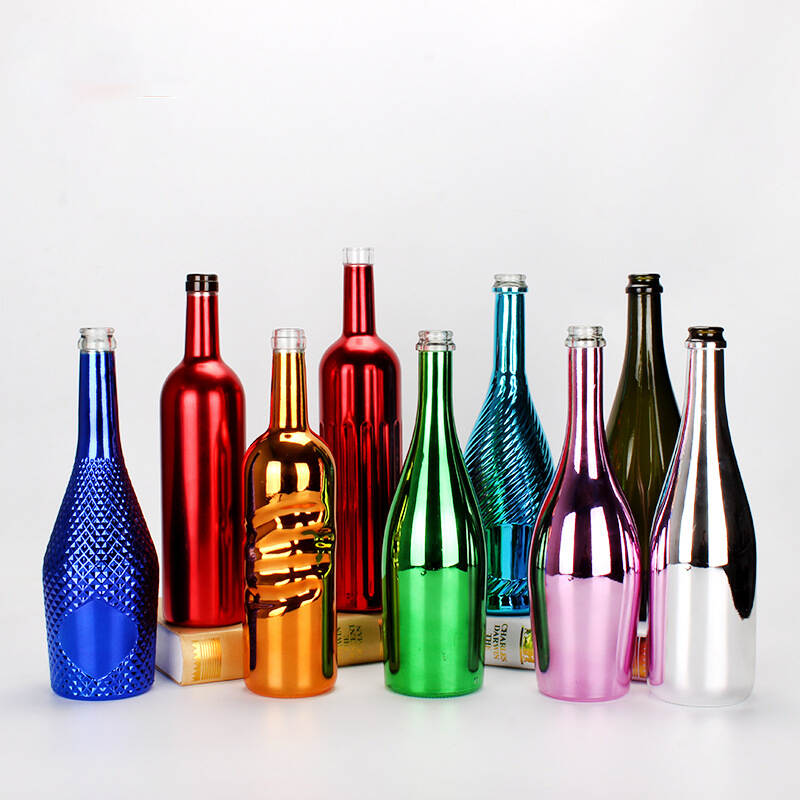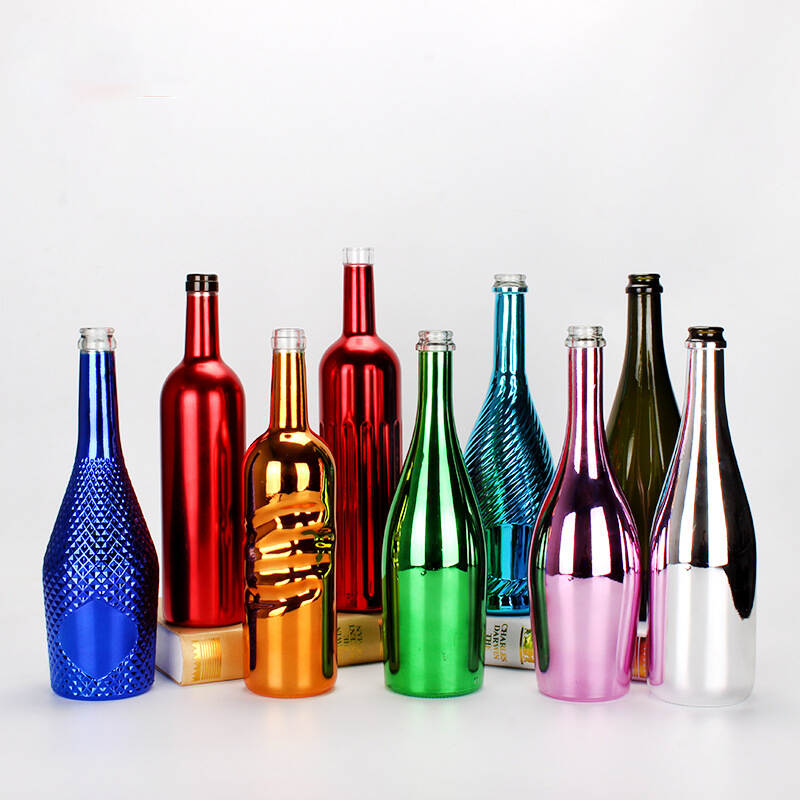Email cannot be empty
Password cannot be empty
Email format error
Email cannot be empty
Email already exists
6-20 characters(letters plus numbers only)
The password is inconsistent
Email format error
Email cannot be empty
Email does not exist
6-20 characters(letters plus numbers only)
The password is inconsistent


In the intricate realm of wine packaging, the vessel's choice holds significant weight—both literally and metaphorically. Among the plethora of options, the "heavy type" wine glass bottle emerges as a distinctive choice. For discerning winemakers and aficionados who prioritize quality and aesthetics, understanding the nuances of these bottles becomes indispensable. Consequently, aligning with a reputable 750-ml heavy-type wine glass bottle supplier can profoundly influence a wine's perception, presentation, and preservation.
The term "heavy type" encapsulates a myriad of distinct characteristics that set these wine bottles apart. Primarily, they boast a sturdier construction, featuring thicker walls and a reinforced base. Such design elements serve multiple purposes: they enhance the bottle's durability, shield the contents from external adversities, and exude an unparalleled sense of luxury and sophistication. As wineries endeavor to craft narratives of excellence and refinement, opting for these bottles becomes not just a choice but a strategic imperative.
Delving deeper, the weight of a 750-ml heavy-type wine glass bottle holds profound implications for the wine aging process. The denser composition of these bottles offers superior insulation against external elements, such as light exposure and temperature fluctuations. By creating a stable environment, they facilitate a harmonious aging process, allowing wines to evolve gracefully. Consequently, winemakers can harness the full potential of their creations, ensuring that each bottle embodies complexity, depth, and character.
Engaging with a distinguished 750-ml heavy-type wine glass bottle supplier necessitates a rigorous commitment to quality control. These suppliers employ a multifaceted approach, incorporating advanced inspection methodologies, stringent material selection criteria, and meticulous manufacturing processes. By integrating automated quality assessments, optical inspections, and stringent testing protocols, they uphold an unwavering standard of excellence. This unwavering commitment resonates with wineries, fostering trust and facilitating collaborative partnerships grounded in shared values and aspirations.
Consistency and uniformity stand as hallmarks of excellence in the wine industry. Recognizing this imperative, 750-ml heavy-type wine glass bottle suppliers leverage cutting-edge technologies and artisanal craftsmanship to maintain unparalleled consistency across batches. By adhering to precise specifications and quality benchmarks, they ensure that each bottle resonates with the brand's ethos, aesthetic vision, and quality standards. This steadfast commitment to excellence instills confidence among wineries, forging enduring relationships rooted in mutual respect and shared success.
Navigating the pricing dynamics among various 750-ml heavy-type wine glass bottle suppliers reveals a spectrum of strategic approaches. While some suppliers emphasize volume-based incentives and competitive pricing models, others prioritize value-added services such as bespoke customization, branding solutions, and collaborative design consultations. Moreover, geographical nuances, raw material costs, and operational efficiencies can introduce additional layers of complexity. Therefore, wineries must adopt a holistic perspective, evaluating both tangible and intangible factors to identify a supplier that aligns with their unique requirements and aspirations.

The materials employed by 750-ml heavy-type wine glass bottle suppliers encompass a diverse array of compositions and formulations. While traditional soda-lime glass remains a prevalent choice, innovations in borosilicate and crystalline glass offer enhanced durability, clarity, and aesthetic appeal. Furthermore, a growing emphasis on sustainability has catalyzed the integration of recycled glass components, aligning with eco-conscious initiatives and environmental stewardship. By embracing diverse materials and innovative technologies, suppliers cater to evolving market dynamics, consumer preferences, and industry trends.
The geographical proximity of a 750-ml heavy-type wine glass bottle supplier profoundly influences cost structures, availability, and logistical considerations. Suppliers strategically situated near raw material sources, manufacturing hubs, and distribution networks can optimize operational efficiencies, reduce lead times, and mitigate supply chain complexities. Conversely, international suppliers introduce additional variables such as shipping logistics, customs regulations, import duties, and currency fluctuations. Therefore, wineries must adopt a nuanced approach, balancing cost considerations with supply chain resilience, flexibility, and strategic alignment.
Achieving seamless compatibility between 750-ml heavy-type wine glass bottles and diverse wine varieties and brands remains paramount. Suppliers collaborate closely with wineries, understanding specific requirements related to bottle dimensions, closures, labeling, and aesthetic considerations. Whether accommodating unique bottle shapes for sparkling wines, integrating specialized closures for aging wines, or facilitating innovative branding solutions, suppliers adapt their offerings to align with evolving industry trends, consumer preferences, and brand narratives.
750-ml heavy-type wine glass bottle suppliers often provide comprehensive storage guidelines and recommendations to preserve bottle integrity, wine quality, and consumer satisfaction. These guidelines may encompass optimal temperature and humidity levels, light exposure mitigation strategies, appropriate handling, transportation considerations, and long-term storage best practices. By adhering to these recommendations, wineries can safeguard their investments, mitigate potential risks, and ensure that wines retain their vibrancy, complexity, and character from bottling to consumption.
Efficient inventory management stands as a cornerstone for 750-ml heavy-type wine glass bottle suppliers, facilitating seamless collaboration, responsiveness, and customer satisfaction. Suppliers leverage advanced forecasting techniques, data analytics, and supply chain optimization strategies to maintain optimal stock levels, align with varying demand fluctuations, and facilitate timely deliveries. Furthermore, strategic partnerships with logistics providers, warehousing solutions, and distribution networks enable suppliers to navigate supply chain complexities, mitigate risks, and foster enduring relationships with wineries and industry stakeholders.
In summation, the intricate process of selecting a reputable 750-ml heavy-type wine glass bottle supplier transcends mere transactional interactions. It embodies a collaborative partnership grounded in shared values, aspirations, and commitment to excellence. By prioritizing attributes such as quality, consistency, innovation, and customer-centricity, wineries can navigate the multifaceted landscape of wine packaging, ensuring that their products resonate with consumers, stand testament to excellence, and forge enduring legacies in the dynamic and evolving world of wine.